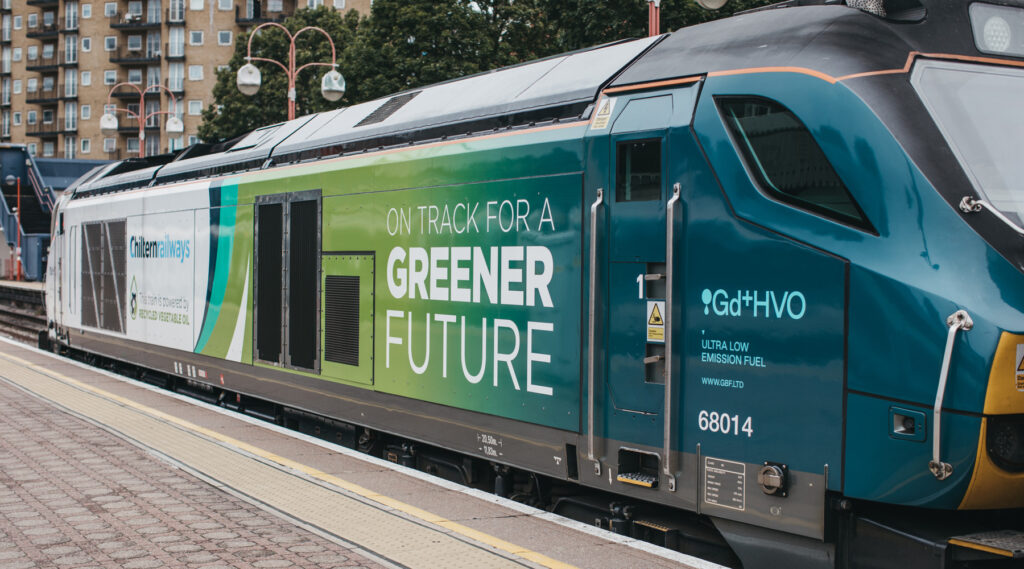Chiltern Railways has started running trains powered by waste vegetable oil instead of conventional diesel in the UK’s first example of Hydrotreated Vegetable Oil (HVO) being used in a UK passenger train.
The operator’s Class 68 locomotive-hauled trains will be powered with the new fuel, derived from used cooking oils, tallows and other recyclable wastes, rather than conventional diesel, reducing the impact the trains have on the environment and air quality across its network.
HVO fuel is made almost entirely from used cooking oils and can reduce greenhouse gas emissions by up to 90% and air particulates by 85%. A fossil free drop-in alternative to conventional diesel fuel, HVO contains few impurities and burns cleanly. It can reduce other emissions such as NOx and Carbon Monoxide, depending on engine type and usage.
HVO is made by the hydrocracking or hydrogenation of vegetable oil. Hydrocracking breaks big molecules into smaller ones using hydrogen while hydrogenation adds hydrogen to molecules. These methods can be used to create substitutes for conventional liquid fuels. The HVO being used by Chiltern Railways is supplied by Green Biofuels.
Although HVO fuel is more expensive to buy than conventional diesel, Chiltern says that it has decided to switch to using HVO fuel as part of its plan to modernise and decarbonise its operations.
The Class 68 locomotives being fuelled with HVO haul six Mark III coaches when they are in passenger service, providing seating for more than 300 customers. Chiltern has 25 of these coaches, which are used on services between London Marylebone and Birmingham Snow Hill.
The train company also has 89 vehicles in the Class 165 diesel fleet which are 33 years old, and 85 vehicles in the Class 168 diesel fleet which are 23 years old.








Anything but electrification
I think it’s fair to say that electrification takes a lot of time money to implement, especially as it often involves rebuilding old road bridges.
Whilst in the long term mainlines will hopefully get electrified I doubt many branch lines will. Therefore Hydrotreated Vegetable Oil provides a greener alternative to diesel on mainlines in the short & medium term, and probably long term on branch lines. There’s also battery and hydrogen, which may provide a workable alternative to diesel on non-electrified lines.
Certain forms of ‘biodiesel’ are easily compatible with standard diesel engines, no need to electrify the infrastructure and acquire electrical trains. I’d imagine the emissions reduction / $ ratio is huge.
I guess that’s why the Marylebone (London) to Aylesbury services have all been cancelled for days now…
Shame they haven’t run a full service for most of the year!
Chiltern railway is going to lose me my job .I’ve used your company Aylesbury to Marylebone for the last thirty six years .And from the age of twelve to sixteen going from Aylesbury to Wendover to school .don’t be proud of your efforts less trains and less carriages. And all that money payed out for the hs2 that’s not going to open till twenty twenty nine. Again thank you Chiltern railway.
This website was only founded a decade ago, and isn’t a railway.
Not quite the first passenger train but probably the first public passenger train. The King, when Prince of Wales, undertook a tour of the UK using a loco unit powered using Chip fat, amongst other sources. It was dubbed the “Chip Pan Tour” in certain parts of the press. When it was in Newcastle Central Station the whole place stank like a cheap Take-away outlet. Hope thats improved if nothing else
They missed out the most important bits. No HVO is made in the UK it is all imported from Singapore, Helsinki and Rotterdam. All the feedstocks (raw materials to make HVO) are sourced from China (unverified), Indonesia, US, Malaysia etc the list goes on. HVO uses crude oil palm and POME (palm oil mill effluent) etc the list goes on. Check the ISCC database for country of origin and raw materials used. Can’t be Sustainable and environmentally friendly shipping it in from all over the world, refining it and shipping agin into the UK. Defeats the actual savings made of HVO. There is a UK refiner that takes UK only sourced waste and produces Renewable fuel for the UK. All made here in the UK. All ISCC, RFAS and OFGEM accredited.